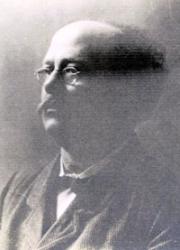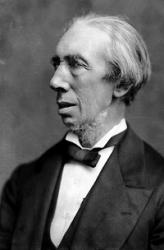Planning worship?
Check out our sister site, ZeteoSearch.org,
for 20+ additional resources related to your search.
- |
User Links
Person Results
J. W. Elliott
1833 - 1915 Composer of "OBLATION" in The Church Hymnary J.W. Elliott was a popular composer of the Victorian period, and is best known for his nursery rhyme music and for his work on hymnals in the 1870s. He was born James William Elliott, in Warwick, England, on February 13, 1833. As a child, he sang as a chorister in the Leamington Parish Church. In those days, choristers were given lessons in all facets of church music, including organ lessons, counterpoint studies, and more in exchange for providing an extraordinary level of service to their parish church (services throughout the week, all holidays, extra services, etc.). The result is that most choristers who completed their studies received an excellent music education, and James was no exception. After starting his career as an organist and choirmaster for a countryside church, his talent became obvious. He moved to London, where he assisted Sir Arthur Sullivan (of Gilbert and Sullivan fame) in editing Church Hymns. In addition, James worked for a music publisher.
His compositions include two operettas, numerous anthems, service music, works for instruments including the very popular harmonium, and most particularly for Nursery Rhymes and Nursery Songs, his children’s music score that sets many of the Nursery Rhymes to delightful music. Several of his hymn tunes are still in use today in many hymnals, most notably his hymn tune “Day of Rest.” He was heavily involved in the preparation of the musical edition of Church Hymns in 1874, the Choral Service Book of 1892, and transcriptions of hymn tunes using harmonies different than the traditional ones found in hymnals. He died in St. Marylebone, London, on February 5, 1915.
--www.nursery-songs.com/
J. W. Elliott
John Farmer

1836 - 1901 Person Name: J. Farmer Composer of "HARROW" in Church Hymns and Tunes Born: August 16, 1835, Nottingham, England.
Died: July 17, 1901, at his home in Oxford, England.
Buried: St. Sepulchre’s Cemetery, Jericho, Oxford, England.
Eldest child of butcher John Farmer and milliner Mary Blackshaw Farmer, John learned to play the piano, violin, and harp when young. He was apprenticed to his uncle Henry Farmer, an organist, composer, and music teacher with a music and musical instrument business in Nottingham. At age 14, John went to study at the Leipzig Conservatory, then three years later under Andreas Spaeth in Coburg for a year. He returned to England in 1853, and entered his father’s lace business. After his mother’s death in 1856, he went to Zürich, Switzerland, where he taught music. He returned to England again in 1861, and became music master of Harrow School in 1864, staying there until 1885. He then accepted an invitation to become organist at at Balliol College, Oxford, where he founded the Balliol Concerts.
During his career, Farmer composed oratorios, cantatas, church music, chamber music and numerous school songs, especially for Harrow School. One of his best known compositions was "Forty Years On," which he wrote at Harrow in 1872. While at Balliol, he composed Warwick School’s first school song, "Here’s a Song For All", in 1892. His other works include:
Cinderella
The oratorio Christ and His Soldiers
The cricketing song "Willow the King"
Music: FARMER
© The Cyber Hymnal™ (www.hymntime.com/tch)
John Farmer
Joseph Barnby

1838 - 1896 Person Name: Joseph Barnby, 1838-1896 Composer of "PRO ME PERFORATUS (ST. OLAVE)" in Hymnal and Liturgies of the Moravian Church Joseph Barnby (b. York, England, 1838; d. London, England, 1896) An accomplished and popular choral director in England, Barnby showed his musical genius early: he was an organist and choirmaster at the age of twelve. He became organist at St. Andrews, Wells Street, London, where he developed an outstanding choral program (at times nicknamed "the Sunday Opera"). Barnby introduced annual performances of J. S. Bach's St. John Passion in St. Anne's, Soho, and directed the first performance in an English church of the St. Matthew Passion. He was also active in regional music festivals, conducted the Royal Choral Society, and composed and edited music (mainly for Novello and Company). In 1892 he was knighted by Queen Victoria. His compositions include many anthems and service music for the Anglican liturgy, as well as 246 hymn tunes (published posthumously in 1897). He edited four hymnals, including The Hymnary (1872) and The Congregational Sunday School Hymnal (1891), and coedited The Cathedral Psalter (1873).
Bert Polman
Joseph Barnby
W. J. Herbert Hogan
Person Name: Frederick William Hogan, 1845- Composer of "MAGHERAFELT" in The Book of Praise Early 20th Century
Currently, our only data on Hogan is that he was a minister.
--www.hymntime.com/tch
W. J. Herbert Hogan
George A. Macfarren

1813 - 1887 Composer of "THY LIFE" in The Hymnal George Alexander Macfarren, Mus. Doc.; b. London, 1813; d. London, 1887
Evangelical Lutheran Hymnal, 1908
=======================
Born: March 2, 1813, Westminster, England.
Died: October 31, 1887, St. Marylebone, England.
Buried: Hampstead Cemetery, London, England.
Brother of Walter Macfarren, George was a principal of the Royal Academy of Music; professor at Cambridge University; conductor at Covent Garden, London; program note writer for the Philharmonic Society; and editor of Handel and Purcell. He wrote 18 operas, 13 oratorios and cantatas, 9 symphonies, and 162 songs. He went blind in 1860, and was knighted in 1883.
Sources:
Frost, p. 681
Lightwood, p. 189
Nutter, p. 460
http://www.hymntime.com/tch/bio/m/a/c/macfarren_ga.htm
===============================
http://en.wikipedia.org/wiki/George_Alexander_Macfarren
George A. Macfarren
David Bruening
1869 - 1934 Person Name: Rev. David Brüning Composer of "FOR THEE" in The Evangelical Hymnal Born: December 10, 1869, Richmond, Virginia. Died: May 2, 1934, Baltimore, Maryland.
The son of German immigrants, Brüning graduated from Elmhurst College in 1889, and Eden Seminary, St. Louis, Missouri, in 1892. He was ordained at St. Paul’s Church, Chicago, Illinois, in July 1892 by Rudolph John. He went on to serve the parishes of Rosehill, Chicago (1892-98); St. Paul’s, Pekin, Illinois (1898-1904); St. Peter’s, Louisville, Kentucky (1904-20), and St. Matthew’s, Baltimore, Maryland (1920-34). He was also president of the Indiana District of the Evangelical Synod; chairman of the board of directors of Eden Seminary; and editor of the 1917 Evangelical Hymnal.
Sources: Haeussler, pp. 569-70
© The Cyber Hymnal™. Used by permission. (www.hymntime.com)
David Bruening
John Bacchus Dykes

1823 - 1876 Person Name: Rev. J. B. Dykes, Mus. Doc. Composer of "[Thy life was given for me]" in The Hymnal, Revised and Enlarged, as adopted by the General Convention of the Protestant Episcopal Church in the United States of America in the year of our Lord 1892 As a young child John Bacchus Dykes (b. Kingston-upon-Hull' England, 1823; d. Ticehurst, Sussex, England, 1876) took violin and piano lessons. At the age of ten he became the organist of St. John's in Hull, where his grandfather was vicar. After receiving a classics degree from St. Catherine College, Cambridge, England, he was ordained in the Church of England in 1847. In 1849 he became the precentor and choir director at Durham Cathedral, where he introduced reforms in the choir by insisting on consistent attendance, increasing rehearsals, and initiating music festivals. He served the parish of St. Oswald in Durham from 1862 until the year of his death. To the chagrin of his bishop, Dykes favored the high church practices associated with the Oxford Movement (choir robes, incense, and the like). A number of his three hundred hymn tunes are still respected as durable examples of Victorian hymnody. Most of his tunes were first published in Chope's Congregational Hymn and Tune Book (1857) and in early editions of the famous British hymnal, Hymns Ancient and Modern.
Bert Polman
John Bacchus Dykes
A. Croil Falconer
1850 - 1903 Person Name: A. C. Falconer Composer of "ST. VIGIAN" in The Church Hymnal Born: October 24, 1850, Ferryport-on-Craig, Fife, Scotland.
Died: March 30, 1903, Islington, London, England.
A. Croil Falconer
George Lomas
1834 - 1884 Composer of "[Thy life was giv'n for me]" in Songs of Victory Born: 1834, Birch Hall, Bolton, Lancashire, England.
Died: 1884, Sheffield, South Yorkshire, England.
A student of William Sterndale Bennett and Charles Steggall, Lomas received his BMus degree from New College, Oxford. He played the organ at Didsbury Parish Church, and at Emmanuel Church, Barlow Moor, Manchester (1858-84).
Music: CHAMOUNI
ST. PAUL'S COLLEGE
SURSUM CORDA
http://www.hymntime.com/tch/bio/l/o/m/lomas_g.htm
=============
George Lomas was born in England and was a volunteer organist for twenty-five years before becoming a professional musician. He received his Bachelor of Arts degree in music at age forty-five, only five years before his death.
The Presbyterian Hymnal Companion, 1993
George Lomas
Frank S. Hunnewell
b. 1860 Person Name: Rev. Frank S. Hunnewell Composer of "PHILEO" in Gloria Hunnewell, pastor of the Presbyterian Church in White Plains, New York, was living in 1918, when his 23-year old son Donald was killed in World War I.
Sources
New York Times, November 24, 1918, p. 23
Music--
OAKLAND
PARTING HYMN
SALVATOR
WOODBRIDGE
--www.hymntime.com/tch
Frank S. Hunnewell


 My Starred Hymns
My Starred Hymns

